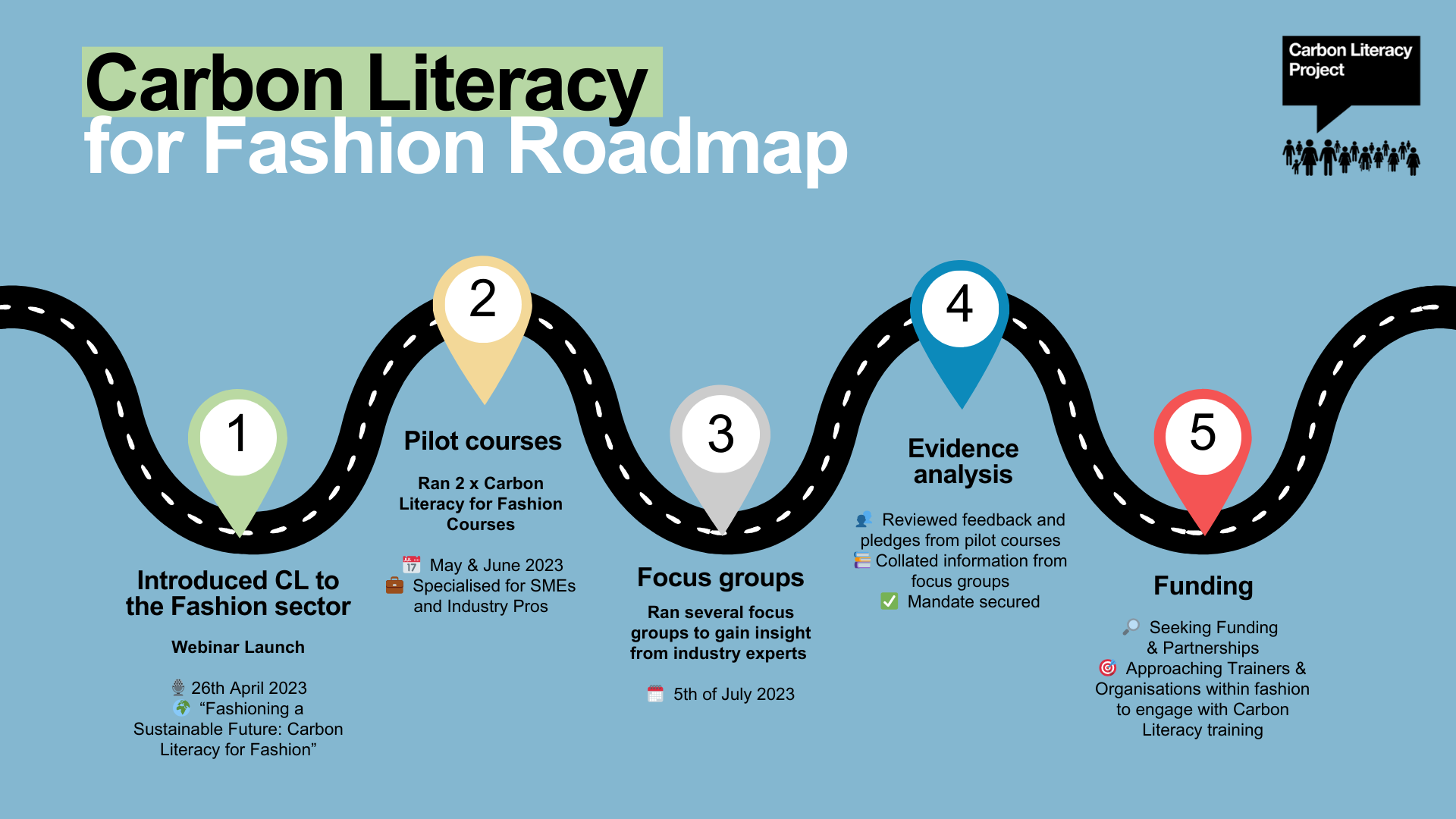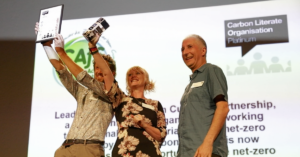
As one of the largest consumer-facing sectors, fashion holds significant responsibility when it comes to climate action. With its vast supply chains, production processes and the economic value it holds – the sector has the potential to make a substantial impact on global emissions and the environment.
However, a recent report by Fashion Revolution revealed the global fashion industry’s unimpressive progress on transparency and its shortcomings in the face of the ongoing climate crisis. Similarly, UNEP and UNFCC’s Sustainable Fashion Communication Playbook highlights that the sector is not on track to meet its sustainability targets nor contribute to the global intention of the SDGs or the Paris Agreement. Despite the commitments to achieving net-zero emissions, progress towards decarbonisation has been alarmingly slow compared to other sectors. This lack of momentum, coupled with the sector’s notorious greenwashing practices, poses a significant risk to the world’s journey towards achieving its climate targets.
To address these pressing challenges, transforming the textile and fashion value chains to become sustainable and circular is paramount. However, achieving this sector-wide transformation cannot be accomplished by any single group of actors alone. It necessitates the collective efforts of all stakeholders, working collaboratively towards a low-carbon future.
A Glimpse into the Carbon Literacy Focus Group
On 5th July, we held a focus group discussion on Carbon Literacy in the fashion sector. The event saw enthusiastic participation from various stakeholders and professionals within the industry, marking an important milestone in our ongoing work.
The focus group served as a platform for meaningful discussions and insightful perspectives on how Carbon Literacy can help the sector foster a low-carbon culture. We delved into key sustainability issues, identified focus areas and examined the industry’s barriers to climate action.
- Participants underscored the lack of funding
- Insufficient legislation
- Rampant greenwashing
- Lack of infrastructure necessary for circularity, transparency, and standardised metrics for measurement and reporting
However, the fashion sector is not void of motivating factors for sustainability. Some of these include:
- The rise of conscious consumerism
- The influence of NGOs, charities and influencers
- Incentives tied to Environmental, Social and Governance (ESG) scores
It was highlighted that while the EU is leading the way with robust legislation, creating incentives for businesses to align with climate targets, there is a need for consistent international regulation to bridge the gaps in motivation and encourage unified progress.
The discussions also uncovered the need for climate education within the sector, highlighting the potential of Carbon Literacy to drive meaningful change. A tailored education that caters to the multifaceted nature of the fashion sector is necessary to empower professionals across the industry to take climate action.
The need for Carbon Literacy
Climate education is the missing piece of the puzzle that can bridge the gap between sustainability targets and meaningful climate action within the fashion industry.
Information vs action
While the sector has an abundance of data and information when it comes to its climate impact, it often lacks the necessary context and relevance for different players, particularly when it comes to textiles. For instance, what’s pertinent for a high street brand may not entirely apply to a luxury brand. There is a lack of practical guidance and application on how to make substantial impacts and cut emissions in the manufacturing processes and supply chains.
When asked what sustainability training was available in the sector, participants’ feedback indicated that there are many sustainability forums, panel lectures, discussions, talks and networks, but not much specific training. There were some courses suggested which target specific areas and elements of the sector, such as transport or material choice. However, not many covered the overarching picture.
The certification maze
There’s also a significant challenge for companies aspiring to attain certifications to build trust with consumers and other stakeholders. From sustainability and environmental certifications (like B Corp and Bluesign) to fibre standards, chemical control and circular standards — the realm of certifications is vast and varied. What’s missing is a clear, practical roadmap that outlines which certifications are relevant and how to achieve them.
Collective effort
Climate action isn’t the sole responsibility of a select few within a company, such as the sustainability teams. True transformation will occur when the entire workforce is engaged and informed. Only then can climate targets become a shared responsibility woven into the company’s culture and values.
What’s next?
Based on the information gathered from the focus groups, we believe that there is a real need for an educational training initiative in this sector. We would like to work with the sector to develop a Carbon Literacy Toolkit, which would enable the delivery of a day’s worth of accredited learning, and action on, climate change, to people within the Fashion sector.
The proposed Toolkit would offer multiple off-the-shelf courses which organisations in the sector could use to train their staff in Carbon Literacy. From SMEs to larger businesses, the training would cater to the wide scope and diverse nature of the fashion sector.
To achieve this, we are actively seeking funding opportunities to support our initiatives within the sector. Collaboration is key to driving significant change, and we invite organisations who share our vision to join us.
Get involved
Want to contribute to our ongoing work in the fashion sector? We would love to hear from trainers, sustainability experts, industry professionals and organisations committed to driving a positive impact.
If you are interested in CL for Fashion and want to influence and shape a Toolkit for the sector or pilot it in due course, please drop us a line at fashion@carbonliteracy.com.
Sign-up for the mailing list for Carbon Literacy for Fashion updates!
- SEO Powered Content & PR Distribution. Get Amplified Today.
- PlatoData.Network Vertical Generative Ai. Empower Yourself. Access Here.
- PlatoAiStream. Web3 Intelligence. Knowledge Amplified. Access Here.
- PlatoESG. Carbon, CleanTech, Energy, Environment, Solar, Waste Management. Access Here.
- PlatoHealth. Biotech and Clinical Trials Intelligence. Access Here.
- Source: https://carbonliteracy.com/carbon-literacy-for-fashion-progress-next-steps/?utm_source=rss&utm_medium=rss&utm_campaign=carbon-literacy-for-fashion-progress-next-steps
- :has
- :is
- :not
- 500
- 5th
- a
- abundance
- accomplished
- accredited
- Achieve
- achieving
- across
- Action
- actively
- actors
- address
- Agreement
- align
- All
- alone
- also
- an
- and
- any
- Application
- Apply
- ARE
- areas
- AS
- aspiring
- At
- attain
- available
- b
- barriers
- BE
- become
- been
- believe
- between
- brand
- BRIDGE
- build
- build trust
- businesses
- but
- by
- CAN
- cannot
- carbon
- cater
- caters
- Certification
- certifications
- chains
- challenge
- challenges
- change
- Charities
- chemical
- choice
- clear
- Climate
- climate action
- Climate change
- climate crisis
- collaboration
- Collective
- COM
- comes
- commitments
- committed
- Communication
- Companies
- company
- Company’s
- compared
- conscious
- consistent
- Consumers
- context
- contribute
- control
- Corp
- could
- coupled
- course
- courses
- covered
- Creating
- crisis
- Culture
- Cut
- data
- decarbonisation
- delivery
- Despite
- develop
- different
- discussion
- discussions
- diverse
- drive
- driving
- Drop
- due
- Economic
- economic value
- Education
- educational
- efforts
- elements
- Emissions
- empower
- enable
- encourage
- engaged
- enthusiastic
- Entire
- entirely
- Environment
- environmental
- ESG
- EU
- Event
- experts
- Face
- factors
- Fashion
- feedback
- few
- Focus
- For
- forums
- Foster
- from
- funding
- funding opportunities
- future
- gap
- gaps
- gathered
- Glimpse
- Global
- governance
- Group
- Group’s
- guidance
- hear
- Held
- help
- High
- Highlighted
- highlighting
- highlights
- holds
- How
- How To
- However
- HTTPS
- identified
- Impact
- Impacts
- important
- in
- Incentives
- include
- indicated
- industry
- industry’s
- influence
- information
- informed
- Infrastructure
- Initiative
- initiatives
- insightful
- instance
- Intention
- interested
- International
- into
- invite
- issues
- IT
- ITS
- join
- Join us
- journey
- July
- Key
- Lack
- larger
- largest
- leading
- learning
- lectures
- Legislation
- like
- Line
- List
- literacy
- love
- low-carbon
- Luxury
- mailing
- make
- manufacturing
- many
- marking
- material
- max-width
- May..
- meaningful
- measurement
- Meet
- Metrics
- milestone
- missing
- Momentum
- Motivation
- much
- multifaceted
- multiple
- Nature
- necessary
- Need
- net-zero
- networks
- next
- NGOs
- nor
- notorious
- occur
- of
- offer
- often
- on
- ONE
- ongoing
- only
- opportunities
- or
- Organisations
- Other
- our
- outlines
- overarching
- panel
- Paramount
- paris
- Paris Agreement
- participation
- particularly
- People
- perspectives
- picture
- piece
- pilot
- platform
- plato
- Plato Data Intelligence
- PlatoData
- players
- please
- poses
- positive
- potential
- Practical
- practices
- pressing
- processes
- Production
- professionals
- Progress
- project
- proposed
- puzzle
- real
- realm
- recent
- Regulation
- relevance
- relevant
- responsibility
- Revealed
- Revolution
- Rise
- Risk
- roadmap
- robust
- saw
- scope
- SDGs
- sector
- Sectors
- seeking
- Shape
- Share
- shared
- shortcomings
- significant
- Similarly
- single
- slow
- SMEs
- Social
- some
- specific
- Staff
- stakeholders
- standards
- Steps
- street
- substantial
- such
- supply
- Supply chains
- support
- Sustainability
- sustainable
- tailored
- Take
- Talks
- Target
- targets
- teams
- textiles
- that
- The
- the information
- their
- Them
- then
- There.
- These
- this
- Tied
- to
- toolkit
- towards
- track
- Train
- Training
- Transformation
- transforming
- Transparency
- transport
- true
- Trust
- uncovered
- unified
- us
- use
- value
- Values
- various
- Vast
- vision
- vs
- want
- was
- Way..
- we
- were
- What
- when
- which
- while
- WHO
- wide
- will
- with
- within
- Work
- Workforce
- working
- world’s
- worth
- would
- woven
- you
- zephyrnet












